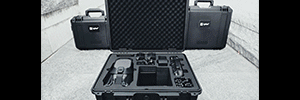...the FAA already regulates airspace, so why should state and local governments in addition to the FAA add additional regulations.
Why?…because your neighbors, your patients, your friends and family complain.
They complain to your local park administration. They complain to your city and county parks commission. They complain to your state legislature. They say, “There are drones flying all over my area—all the time. They spy into my bedroom windows. In no time at all one of them is going to fall out of the sky and scar my poor little Sally’s beautiful face for the rest of her life. Who will be responsible for that? There needs to be a law against these flying lawnmowers!”
or
“Those drones are scaring the bison. Something must be done."
Rational or not this is the kind of pressure government officials are receiving. There are more people like that than there are of us.
Another point is sate and local governments do not have expertise in this matter to regulate airspace.
Expertise is not particularly relevant to whether or not anyone or group will or will not do something. This forum and YouTube can provide several examples of people, who have never flown a drone before, popping a Mavic out of the box it came in, charging the batteries, and immediately launching the Mavic into the wall in their bedroom.
Some rule makers have no expertise. Some may have a little. Here are examples in my local area. I think we can all take lessons from them.
One example of limited expertise is Ordinance 38,
http://www.ebparks.org/Assets/_Nav_Categories/Activities/Ordinance+38+-+EBRPD.pdf, of the East Bay Regional Park District (EBRPD) in the San Francisco Bay Area. Ordinance 38, Section 409 states, “No person shall…fly any UAS closer than 500 feet above District parklands, as defined by Federal Regulations.” For their “500 feet above District parklands, as defined by Federal Regulations” they refer to “Minimum and safe altitudes” in
14 CFR 91.119 - Minimum safe altitudes: General.. Upon examination it is clear that this definition does not refer to UASs or UAVs. Since 400 feet AGL is the recommended upper limit of UAS flight, their statement is both incorrect and absurd. EBRPD's mistake was being too specific.
The nearby and occasionally contiguous East Bay Municipal Water District (EBMUD) is not specific with respect to UAVs. Whether this is expertise or oversight one can’t be sure. Their trail permit for access to their property disallows drones. However, their “Watershed and Recreation Rules and Regulations”,
East Bay Municipal Utility District :: Rules and regulations, does not mention drones, unmanned aircraft, or unmanned aerial vehicle. Their prohibition of drones is likely upheld by their General Nuisance sections 9.03, 9.04, 9.05, or 9.06. This is similar in effect to the National Park’s limitation in that UAVs cannot be operated from park property, however, there can be no limitation flying over park property.
State and local agencies increasingly will be encouraged to regulate UAVs. Those that do not attempt to specifically limit National Air Space (NAS) in their regulations, but more generally limit what can be done on their property, will likely be more successful.











